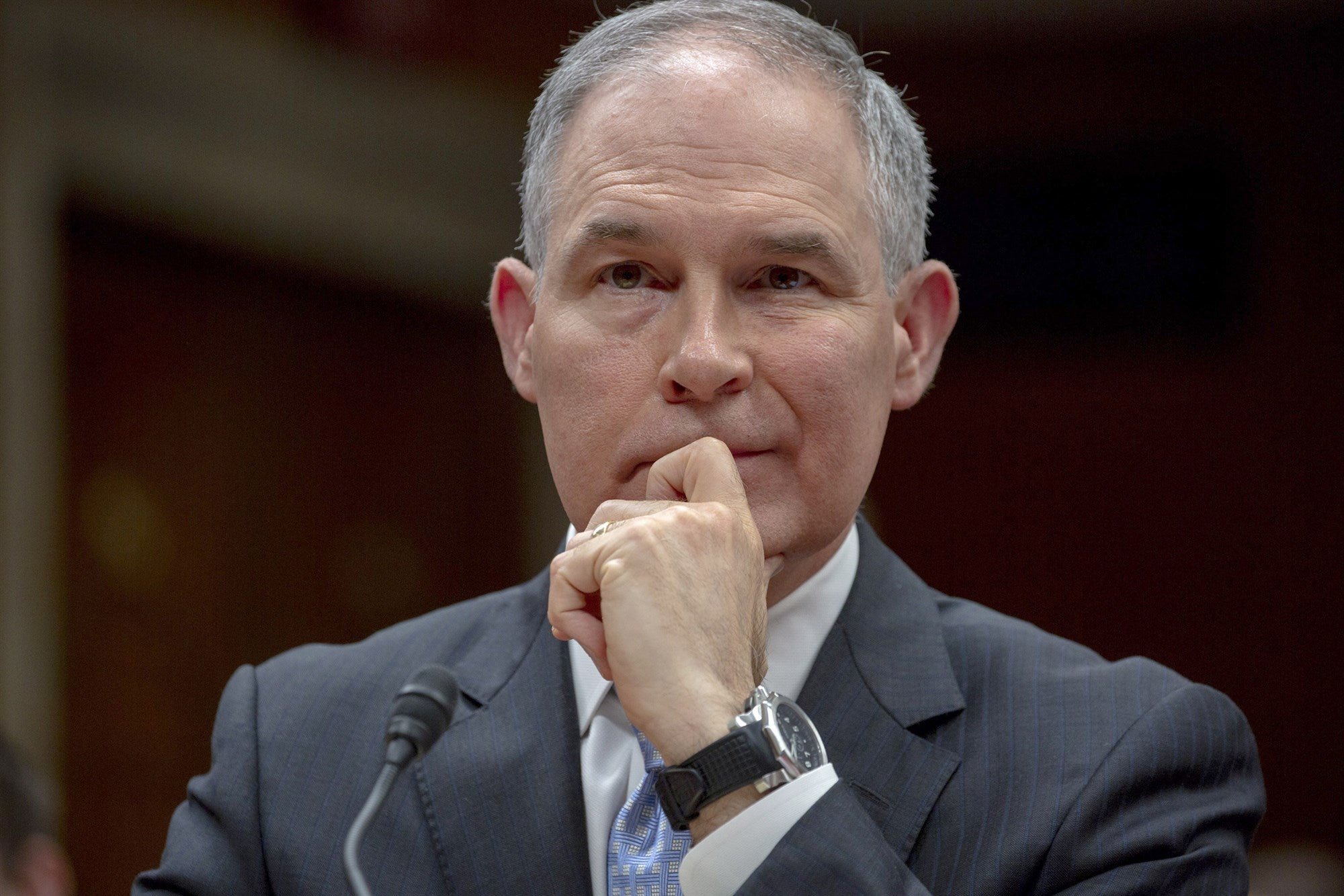The Real Scott Pruitt Scandal Is His Coming Crusade to Help Car Companies Pollute More
The head of the EPA is reportedly considering a plan to thwart California’s clean air standards.

This page was published 7 years ago. Find the latest on Earthjustice’s work.
This piece was originally published on NBC Think. For more information about Pruitt’s efforts to weaken vehicle emission standards, see our explainer.
Even if you don’t live there, most Americans’ lives have been improved by California’s environmental regulations. That’s because since the 1970s, the federal government has allowed the state to set more stringent clean air regulations for cars than at the national level, and 13 other states to follow California’s lead. And so by default, most car companies simply build and sell products that meet California’s more stringent regulations, allowing more people to benefit from cleaner air.
President Trump’s Environmental Protection Agency Administrator, Scott Pruitt, is going to try to change all that.
Pruitt is rumored to be drafting a regulation to rescind California’s waiver in the Clean Air Act in a ham-handed attempt to gut commonsense vehicle emissions standards and undermine states’ ability to protect their air. But if that proves to be true, Pruitt will likely continue his courthouse losing streak, provide the Trump administration with its most absurd legal fumble yet and not even distract folks from his scandal-ridden tenure.
The latest reports state that Pruitt plans to move ahead with drafting new, weaker vehicle emissions standards without consulting California, even though Trump last month directed Pruitt and Transportation Secretary Elaine Chao to sit down with auto makers and California’s leaders to negotiate vehicle emissions standards. It’s expected that the new rule won’t recognize California’s long-standing right to set its own standards.
But that would be a losing move — and the resulting legal battle might well outlast Pruitt.
The state waiver under the Clean Air Act has legal roots that stretch back over 50 years: It was granted by Congress, and cannot be unraveled by an EPA rulemaking.
When Congress amended the Clean Air Act in 1970, it empowered the EPA to set new national standards on air pollution from cars and factories. It was the federal government’s most aggressive bid yet to address the dangers of toxic air pollution. Congress also granted California a special authority, written into the Act itself. It empowered California to ask the EPA administrator for a “waiver” to allow the state to restrict tailpipe pollution more stringently than the federal government, and if the proposed state rules meet specified criteria and are “at least as protective of public health and welfare” as the EPA’s, then the agency must grant the waiver. Other states can choose to adopt California’s more stringent standards to protect the air for their residents, as 13 states have opted to do.
So Pruitt cannot simply rewrite the law and white out California’s special status; it would require an act of Congress. And, for an administration that has consistently lost in court over many of its rulemakings already, going after established clean car standards is a classic case of executive overreach that violates the Constitution’s delegation of authorities.
And, if the Trump administration moves forward with this plan, they will be rewriting the laws of the land to the benefit of no one but the oil industry. (I suppose we shouldn’t be surprised, given the documented record of Scott Pruitt’s cozy history with the oil industry while serving as Oklahoma’s attorney general.)
Everyday Americans who live near roads and highways would suffer from more polluting cars. Tailpipe emissions from cars would revert to weaker federal standards, possibly bringing back the toxic smog that prompted California’s special status in the first place. And, since tailpipe emissions also add to climate change, Pruitt’s plan would set us back years in our efforts to protect the climate.
In total, the health of over 113 million Americans living and breathing in 13 states would suffer — as would the health of other Americans — unless the inevitable challenges to the rule succeed in the courts.
In the nearly 50 years since Congress gave California the authority to regulate tailpipe emissions, no administration has ever attempted to outright revoke a state waiver; prior judicial challenges of California’s waiver have all failed. In 2008, for instance, the Bush administration attempted to deny California a waiver for its regulation to restrict greenhouse gases from cars. But even that effort failed, and the waiver was eventually granted by the Obama administration.
The California Regional Office fights for the rights of all to a healthy environment regardless of where in the state they live; we fight to protect the magnificent natural spaces and wildlife found in California; and we fight to transition California to a zero-emissions future where cars, trucks, buildings, and power plants run on clean energy, not fossil fuels.